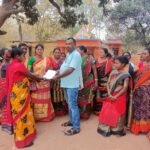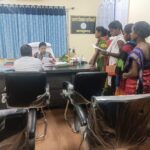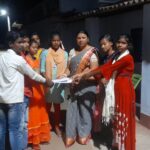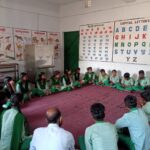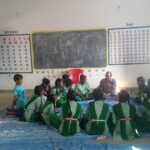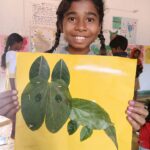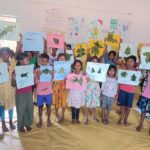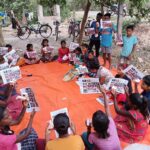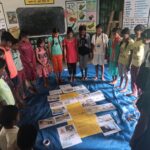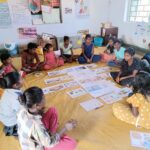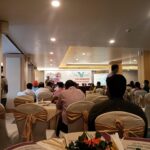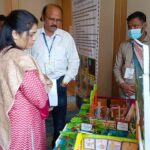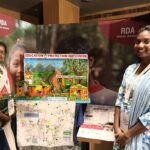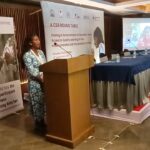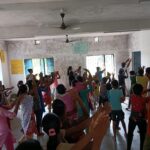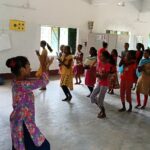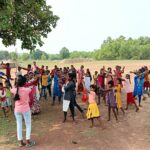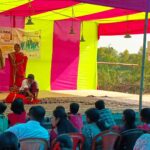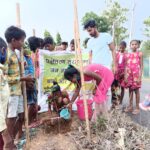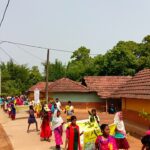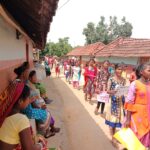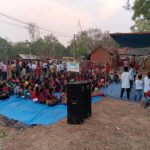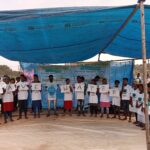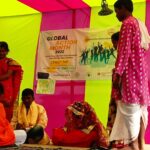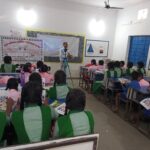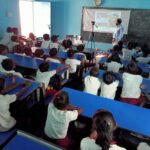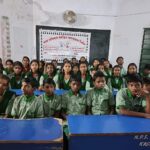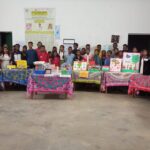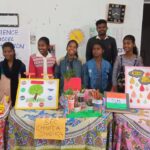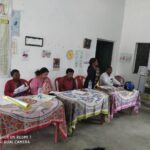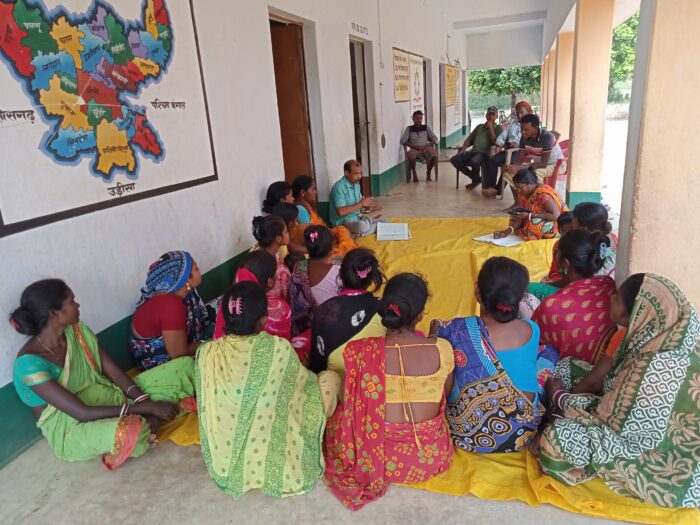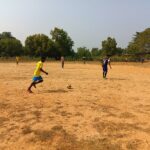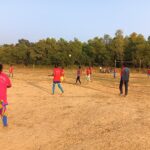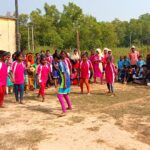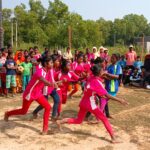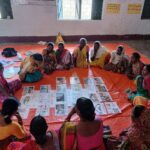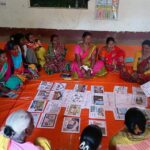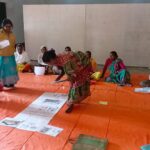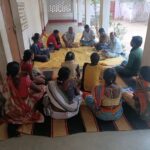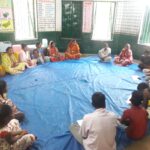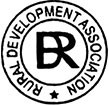

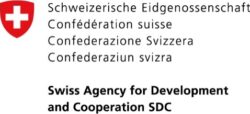
1. “SMILE” – Improvement in Life of the marginalized Tribal Children through Quality Education, Participation and Protection in East Singhbhum district of Jharkhand.
Supported By: Terre des Hommes, Suisse
1. Area of Intervention:
- Protection of Child Rights:
- Protection of children from all types of violence
- Quality education is the basic rights of children
- Ecological rights of children
- Participation of children in decision making in their issues
- Youth as an actor of change
- Women’s empowerment
2. Area of Intervention:
45 villages of 7 panchayats of Ghatsila and Dhalbhumgarh blocks, East SInghbhum.
3. Target Population Covered::
|
Total Achèvement |
|
| Children (<18 years) |
2227 |
| Girls |
1295 |
| Boys |
932 |
| Youth (18-25 years) |
817 |
| Girls |
423 |
| Boys |
394 |
| Adults |
2559 |
| Women |
1650 |
| Men |
800 |
| Teachers (public schools and education centres of RDA) |
109 |
| Women |
27 |
| Men |
82 |
|
TOTAL |
5603 |
| Participation spaces of children |
10 child club, 5 SEC, 10 child cabinet, 12 VLCPC, 12 youth group and 1 M&E Committee |
| Advocacy requests/actions (local/national) by children and youth | 12 appeals formulated and submitted to authorities by children and youth. |
4. Overall Achievements::
Right to Education:
Long two years COVID lockdown and closing of all education institutions changed the study habits of children. After reopening of schools in 2022, all schools faced the problem of irregularity of children in schools, dropout of some of the children and concentration in listening of teaching long time etc. But due to RDA’s continuous hard effort in continuous engagement of children in study of 520 children (58% Girls) of 6th to 10th class children in our 5 support education centres (SEC) was good and they all achieved significant result in final physical examination in their classes and mainly in class 10th children in their final board examination (Matric Exam 2022). At a glance the result of 57 children of 10th class Matric Board examination was – 100% passed, 65% in scored 1st division (57% Girls and 43% boys; 3 children scored above 90%). One child Sujal Das achieved 95.6% marks and ranked topper in Sub-division and 9th position in the district. Sujal wants to be an aerospace engineer. Sujal Das, Ghaniram Mandi and Anita Gope were ranked in 30 toppers list of Jharkhand state. Ghaniram wants to be an IAS officer. They are now studying in class eleven in science stream. This year numbers of children achieved different fellowships of private and state government which will help them higher study at free of cost, free coaching for engineering and medical entrance examination and support for books and study materials. Ghaniram has achieved “Bir Sahid Ganesh Hansda Fellowship”, Anita ranked in “Akansha fellowship” of the government of Jharkhand, 5 children of class 5th have enlisted in Tata Steel foundation education support to brilliant children list and one 9th Class child has enlisted in Chief Minister education support list.
RDA started quality education support to the vulnerable remote rural children in last quarter of 2019 and then there was huge gaps in knowledge of children in mostly English, mathematics and science group as per assessment of expert team of educational professionals. RDA is very happy that for continuous support of TdH, RDA team abled to do significant improvement in knowledge and skill of children. Teachers of SEC applied different methodologies and used different TLM for increasing interest and building clear knowledge of children. RDA team regularly organised parents, teachers and children meeting (PTM) and home visit for sensitising parents on children education, regularise children attendance in the education centres and to know how children are studying at home. RDA developed good relationship with school authority and periodically discussed with teachers on teaching methodologies in school, performance of children and to way out road map for better result of the children. Assessment of children in all 5 SECs was organised at quarterly basis and as per their performance teachers group prepared list of children of 10th class in 4 categories – excellent, good, moderate and poor. Then RDA team prepared teaching strategy for the children for their better result in final examination, e.g. remedial classes for poor category children.
Right to Participation:
RDA team worked on strengthening of child cabinet and SMCs in 10 public schools through training, sensitisation and meeting. They are now monitoring cleanliness, hygiene, food in mid-day meal, developing kitchen garden from the support of RDA, school dropouts and education etc. RDA organised public school children awareness programme in 10 schools and total 1247 have been increased their knowledge on child rights, child protection mechanism, climate change effect and it’s reason and environment protection. Our 10 child clubs were regularly run their centre activities, built their knowledge on child rights and ecological rights through group work, games and activities. 12 youth groups consisting 217 youth of 15 villages organised their group meeting periodically and took numbers of actions and community awareness initiatives with children. 330 children of 10 child clubs were organised numbers of community awareness initiatives with youth on child rights especially on reduce child marriage, zero school dropout, environment protection and environment friendly life style through rally, poster campaign, street play at local markets and villages. They also took numbers of actions with youth, like tree plantation and protection, seedball making and throwing it on fallow land, developing organic kitchen garden at child club premises, homestead land and public schools. Children and youth celebrated numbers of International Days, like World Water Day, Environment Day, Anti child labour day, World Literacy Day and Child Rights Day through awareness rally, street play, poster campaign, plantation, no plastic campaign and village cleaning. Except these, they celebrated Children’s Day and organised annual sports for girls and boys on football and kabaddi. RDA organised sensitisation meeting and training for children, youth, SHG members and adults on child rights, environment protection and child participation.
Environment protection actions:
Youth and children were planted total 2500 local species plants at road side, SEC and child clubs and homestead land of youth and children. Survival rate of plants was 70%. They were also made 10,000 seedball and threw it in fallow land of 15 villages.
RDA capacitated and strengthened children and youth M&E committee members. The committee quarterly monitored all child clubs and SECs, talked with children, noted their feedback and suggestions and shared the report in the joint meeting with RDA team. As per their report RDA took actions for better facilities in SEC and child clubs.
Children and youth formulated and submitted total 12 appeals to Prime Minister (National), Local MLA, PRI and Forest department for toilet at SEC and child club of Chhotadhadika, infrastructure and toilet for Juktidih SEC and child club, drinking water for Choroigora school cum child club, drinking water facility for Jharbera child club, supply of plants for plantation programme. Out of 12 appeals, 2 appeals on plants supply by forest department and drinking water at Choroigora school have been fulfilled and PRI members ensured that after receiving of fund they will construct toilet at Chhotadhadika SEC and child club.
Total 1900 children and youth (56% Girls) and 1700 adults (70% women) increased their knowledge on child rights, right to education of children, effect on climate change and environment protection – save water, reduce use of plastic, save electricity, clean village and reduce use of chemicals and go for organic for leaving a better environment for the children.
Right to Protection:
In two years COVID period, mainstream child protection mechanism was loosened and increased child marriage in Jharkhand. As per data of Govt. of India, Jharkhand is the 2nd largest cases of child marriage and percentage of child marriage increased to 5.8% in Jharkhand which is very bad for the life of children.
RDA team organised numbers of sensitisation and capacity building training of children, youth, parents, SHG members, teachers, facilitators and VLCPC members on child rights, violence against children, child protection mechanism and support system. The organisation was also strengthened information system for on-time receiving of any case of violence against children. 70% of 850 children and young people perceive an improvement of their protection in families, child club, SEC, schools and communities and benefiting from protective environment. For these initiatives we received information of 5 child marriage cases from our operational villages and stopped all 5 child marriages and all the children are continuing their education.
Youth vigilance group consisting 27 youth regularly monitored the children physically and over the phone call. In this reporting period children and youth identified 6 school dropout children and readmitted in school and they all are continuing their education.
In 2022, 5 children from very poor families of village Basajhore went to Jammu and Kashmir state through a middleman for work. Later on, they realised their job is hazardous for their health and they are working as bonded labour, they tried to came back but not able to do that. Then one child contacted with our facilitator and he informed to our focal person of child protection. RDA staffs contacted with 2 local MLAs, district member of PRI and district administration for way out to rescue the children from Kashmir. After repeated effort and help of all stakeholders all 5 children have been rescued and readmitted in school. They are now continuing their education.
At least 700 children and youth (56% girls) benefitted from protective environments against harmful practices, discrimination, violence and exploitation in their families, communities and schools.
Women’s Empowerment:
RDA organised numbers of sensitisation and training of SHG members and young women on women’s rights and rights and entitlements of people in social security schemes, MGNREGA (Mahatma Gandhi National Rural Employment Guarantee Act) and accessing procedure of rights under different schemes/ programmes. 450 women organised community awareness rally and poster campaign on 8th March, International Women’s Day in 16 villages with banner. Posters and leaflets on women’s rights. They distributed 2000 leaflets. Through sensitisation actions and training at least 60% of the total 1200 women and young girls’ knowledge have been increased on women’s rights.
Activities:
- Running 10 Child Clubs and 12 Youth Groups
- Running 5 Education Support Centres (SEC) for quality education support to vulnerable tribal children of remote villages.
- Capacity building of children, youth, SHG members, PRI members and community on –
- Child Rights,
- Protection mechanism of children,
- Environment protection,
- Gender equality,
- Child participation,
- Issues affecting the children and youth, demand formulation, submission of demand and follow up.
- Promotion and capacity building village level child protection committee (VLCPC) and child protection committees of RDA.
- Child-led initiation and youth actions – awareness building of community on child rights and environment protection – save electricity, use of alternative energy, reduce and reuse of plastics, plantation drive, development of organic nutrition garden, photography on environment and situation of children etc.
- Environment Protection:
- Awareness building of children, youth and community on climate change, environment protection and practice of environment friendly lifestyle.
- Development of alternative energy “Solar Energy” system in Child Club and Education Centres as an initiative towards environment protection.
- Development of organic kitchen garden
- Save electricity, reduce and reuse of plastic
- Save the tree and plant tree
- Clean Village – Green Village
- Waste Management – Biodegradable and non-biodegradable waste
2. Digital Unify for Kid – Tablet for Kid (T4K)
Supported by: ST Microelectronics Foundation India, Greater Noida, UP.
Objective of the programme:
Introduce children of age group 9 – 14 years in the use of IT and generate their interest in use of IT technology for knowledge building, access information, better education, photography, videography etc.
Coverage: 237 children from 25 remote tribal villages of Ghatsila block, Jharkhand
▀ Image Gallery ▄
Appeal Submission_by children & SHG women
- Submission-of-Appeal-by-SHG-to-Zila-Parishad-scaled
- Submission-of-Appeal-by-SHG-to-BDO-Dhalbhumgarh-scaled
- Appeal-submission-to-Zila-Parishad-PRI-by-children
Child Cabinet Metting in School
- Child-Cabinet-meeting-in-school1
- Child-Cabinet-meeting-in-school2-scaled.
Child Club Activity
CSR Meet_Jamshedpur_22 Sept’22
- Coference-with-NGO-CSR-Govt.-representatives-scaled
- DC-East-SInghbhum_Vijaya-Jadhav
CSR Meet_Kolkata_23 Sept’22 by TdH
- Stall of RDA
- Sharing-experience-by-children-of-RDA-in-CSR-Meet
Dance Therapy_to reduce mental stress of children
- Dance Therapy Training2
- Dance Therapy Training3
- Dance Therapy Training1
Rally-Campaign -Street Play
- Street play on child marriage2
- 5th June_ Celebration of International Environment Day1
- 5th June_ Celebration of International Environment Day2
- 5th June_ Community sensitisation Rally on Anti Child Labour Day
- Street Play by children on Save Water in Gandhania haat (2)
- Street Play by children on Save Water in Gandhania haat
- Street play on child marriage1
School Children’s Training
- Training of school children on child rights2
- Training of school children on child rights1
- Training of school children on child rights
Science Model Exhibition_Dec’22
- Science Model Exhibition by children of 5 Support Education Centre2 (3)
- Science Model Exhibition by children of 5 Support Education Centre2 (1)
- Science Model Exhibition by children in the presence of PRI, Panchayat Heads, Teachers
SMC Meeting
Sports_Children
- Sport_Football1_ Children
- Sport_Football2_ Children
- Sport_Kabadi1_ Children
- Sport_Kabadi2_ Children
Training of SHG
- Training of SHG on Child Rights1
- Training of SHG on Child Rights2
- Training of SHG on Child Rights3
VLCPC Meeting
- Meeting_Village child protection committee (VLCPC)1
- Meeting_Village child protection committee (VLCPC)2


